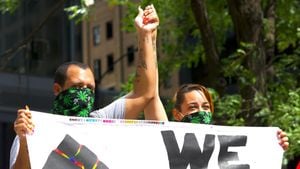Wladimir Klitschko, the celebrated heavyweight boxing champion and brother of Kyiv's mayor, has come out swinging against Joe Rogan, the popular podcaster and UFC commentator, for remarks he made about the war between Ukraine and Russia. Klitschko released a pointed video on X (formerly Twitter) after Rogan insinuated during his podcast, "The Joe Rogan Experience," that President Biden’s authorization for Ukraine to strike Russian targets could potentially incite "World War III."
Reflecting on Rogan’s statements during his chat with music producer Scott Storch, Klitschko, 48, emphasized how misinformation can weaken democracies. He remarked, "You talk about the American weapons being sent to Ukraine, which you believe will lead to the Third World War. So, let me tell you, you are repeating Russian propaganda. Putin's Russia is in trouble, so they want to scare you and people like you."
The video has gained traction online, racking up millions of views, highlighting the strong feelings surrounding this conflict and the prominent figures involved. Klitschko elaborated on Rogan's influence, stating, "His war was supposed to last three days; it has lasted three years thanks to the heroism and sacrifice of us Ukrainians." His comments seek to counteract the narratives which he feels diminish Ukraine's efforts and resilience against Russian aggression.
Kicking off the discussion, Rogan had previously expressed concerns over Biden's decision to allow Ukraine to utilize U.S.-made long-range missiles to attack inside Russia. He claimed this decision heightens the risk of worldwide conflict, saying, "How are you allowed to do this when you're on your way out?" He challenged the rationale behind America’s support for Ukraine during what could be perceived as transitionary governance.
Klitschko, leveraging his platform and standing as both an athlete and activist, called for discourse rather than divisive rhetoric. He stated, "A great America is not one to abandon countries defending freedom with their lives." He invited Rogan to join him for a conversation on the podcast to explore their differing viewpoints directly, saying, "If you invite me on your podcast, we can discuss them like free men."
Significantly, Rogan's remarks come amid rising tensions as Ukraine accelerates its military actions within Russian territory. His comments echo sentiments voiced by Russian officials, who have warned of the severe consequences of Western arms support to Ukraine. Putin himself has accused the U.S. and its allies of driving the conflict beyond Ukrainian borders.
While Rogan has been known for his controversial views, especially since his endorsement of Trump just prior to the elections, Klitschko's response highlights the importance of articulately countering narratives perceived as damaging. He underscored how propaganda is not merely words, but weapons threatening democracy, stating, "You're using the only weapon Putin really intends to use: propaganda. And this weapon really weakens our democracies."
While Rogan acknowledged Russia’s wrongdoing, his comments about the U.S. role have brought upon backlash. Critics assert such rhetoric plays directly to Moscow's narratives, undermining Ukraine's right to self-defense. Klitschko rebutted this notion firmly, reiteraring the stakes of the war not only for Ukraine but for global democratic principles.
Klitschko’s brother, Vitali Klitschko, also prominent as the mayor of Kyiv, has actively engaged within the framework of the international response to Russia's invasion, and Wladimir's remarks come as part of broader efforts to seek global solidarity and support for Ukraine.
The overarching debate between figures like Rogan and advocates like Klitschko demonstrates how public discourse shapes perceptions and policy, especially on such delicate global issues. Rogan's platform allows him to voice perspectives widely, and as such, his statements draw significant attention, influencing followers and listeners, and intertwining with political narratives. Klitschko’s invitation for dialogue stands as both corrective and proactive, encouraging open discussion rather than divisiveness.
This battle of words highlights the intersection between media, public opinion, and geopolitical realities, reaffirming the urgency of securing Ukraine’s place on the global stage amid continuing hostilities. Rogan's apparent refusal to engage openly with Klitschko’s invitation, so far, raises questions about the willingness to confront complex truths rather than simplified narratives.
Remaining at the forefront of these conversations is the broader ethical obligation of public figures to acknowledge and support democratic principles, especially when stakes are as high as they are now. Klitschko's role as both champion and advocate serves as a powerful reminder of the importance of such discussions as the world watches closely, hoping for resolution rather than escalation.



